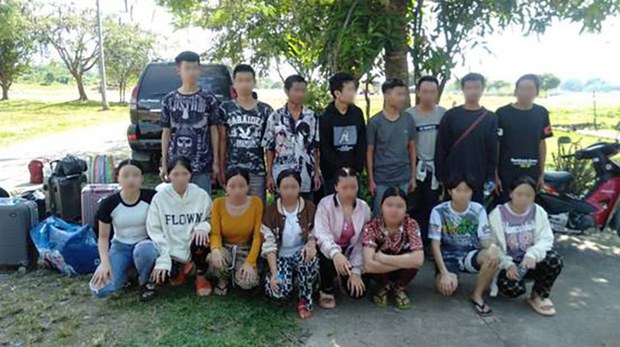The return home for 16 young Laotians who were trafficked to work in a casino in Myanmar did not happen overnight. They first spent two months in a crowded detention center before embarking on a journey via land, air, and river.
Altogether, their time away from home lasted more than a year, during which they were abused by their employers and housed in crowded facilities while in police custody. The victims described their eventual return to Laos in mid-November as akin to arriving “in heaven.”
“I’m so happy. It’s like I’m now in heaven, out of hell after being detained for more than a year in Myanmar,” one of the returnees told RFA Lao late last month, on condition of anonymity for security reasons. “During the first few months at the casino, we were seriously punished, tased, left standing in the sun all day, and sometimes deprived of food. We worked all day, non-stop with no break at all.”
The returnee, who is 20 years old, said he didn’t know what he was going to do in the near future.
“Right now, I’m getting medical treatment for some kind of pox or skin condition. On the one hand, I think about going back to do another ‘chatting’ kind of job, but I’m too scared,” he said. “On the other hand, I also want to go to a vocational school to become either an auto mechanic or an electrician.”
In Myanmar, the trafficking victims were forced by their Chinese bosses to work as scammers, using chat apps to extract money from their victims. Similar scams have also been reported in casinos in Laos.
The returnee recalled the day he was freed, saying, “They threw away all of our phones and didn’t even give us our last month’s salary, which was up to 300,000 baht (US$8,000) for some of us.”
To get back to Laos, the 16 returnees had to take a car from the detention center to Yangon, then board an airplane to Tachileik in Shan state, on the border with Thailand. They then took a boat up the Mekong River to reach Laos’ Bokeo province.
“While on the Myanmar side, on the banks of the Mekong River, we were so happy that we couldn’t eat our lunch,” he said. “The Myanmar authorities asked us whether we wanted to eat. We said no, then they put us on a boat back to Laos.”
A second returnee said the group’s bosses released them with no prior notice.
“All of a sudden, they called our names, including mine, and said, ‘We’re sending you guys back home – you’ve worked so hard and some of you have been punished, so take a rest tomorrow,” he said. “Then all 16 of us were released and taken to two separate rooms in the [Kayin state] town of Myawaddy, one room for males and the other for females. We weren’t able to talk to or see each other. The rooms were guarded by two soldiers at the doors.”
His first impression was that they had been rescued by the Lao government, but this was not the case.
“We packed our stuff, walked out of the gate, and were greeted by a bunch of [Myanmar] soldiers,” the second returnee said. “I also thought that the soldiers would repatriate us right away, but they took us to a military camp in Myawaddy. We couldn’t understand each other, so the soldiers used their phones to translate, telling us not to worry, and that we’d be detained first because we entered Myanmar illegally.”
The second returnee described appalling conditions during what ended up being two-and-a-half months of detention.
“We were not allowed to contact the outside, not even the Lao Embassy in Myanmar,” he said. “The men stayed in a small room, very crowded, with no place to sleep and no place to sit. My 4-square-meter (43 square-foot) room housed 58 people with one small toilet.”
He said that he and the other seven men in his group were infected with pox at the detention center.
“In the casino, we didn’t have any health issues, but in the detention center, there wasn’t enough water,” he said. “We had to wash ourselves with two or three scoops of water and no soap.”
The second returnee expressed relief to be back in Laos with his family.
“Now, seeing my parents and cousins, nieces and nephews, I’m so relieved,” he said. “It doesn’t matter whether or not we have or don’t have any money, we’re happy just living under the same roof and eating at the same table.”
The mother of a third returnee told RFA that she was ecstatic to see her son for the first time in over a year when he returned in mid-November.
“I didn’t know what to do. It’s really a miracle,” she said. “Months ago, I thought I had lost him. Now, we’re together and in each other’s arms.”







